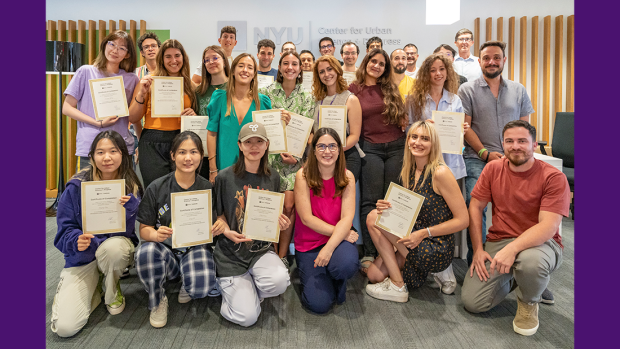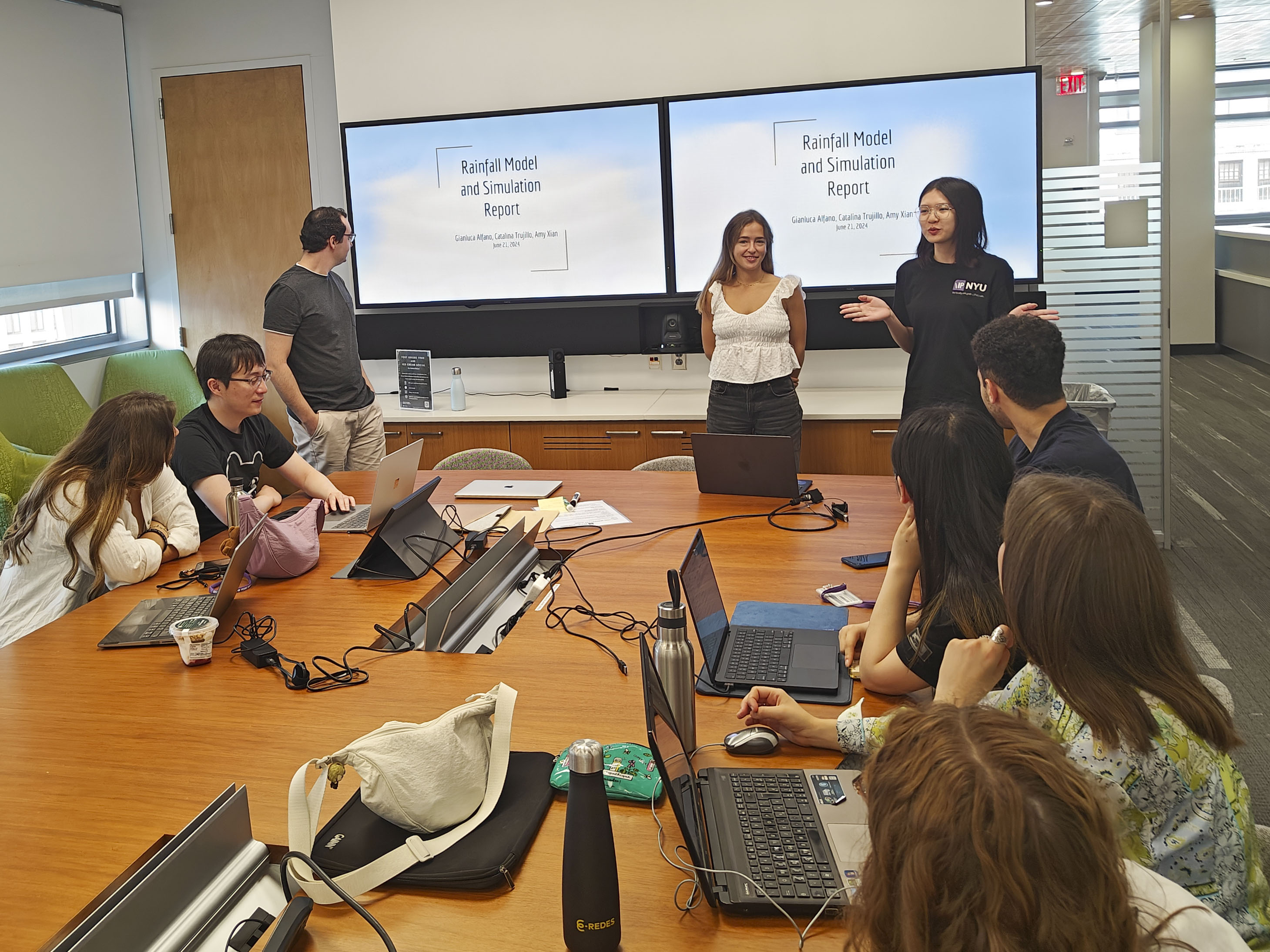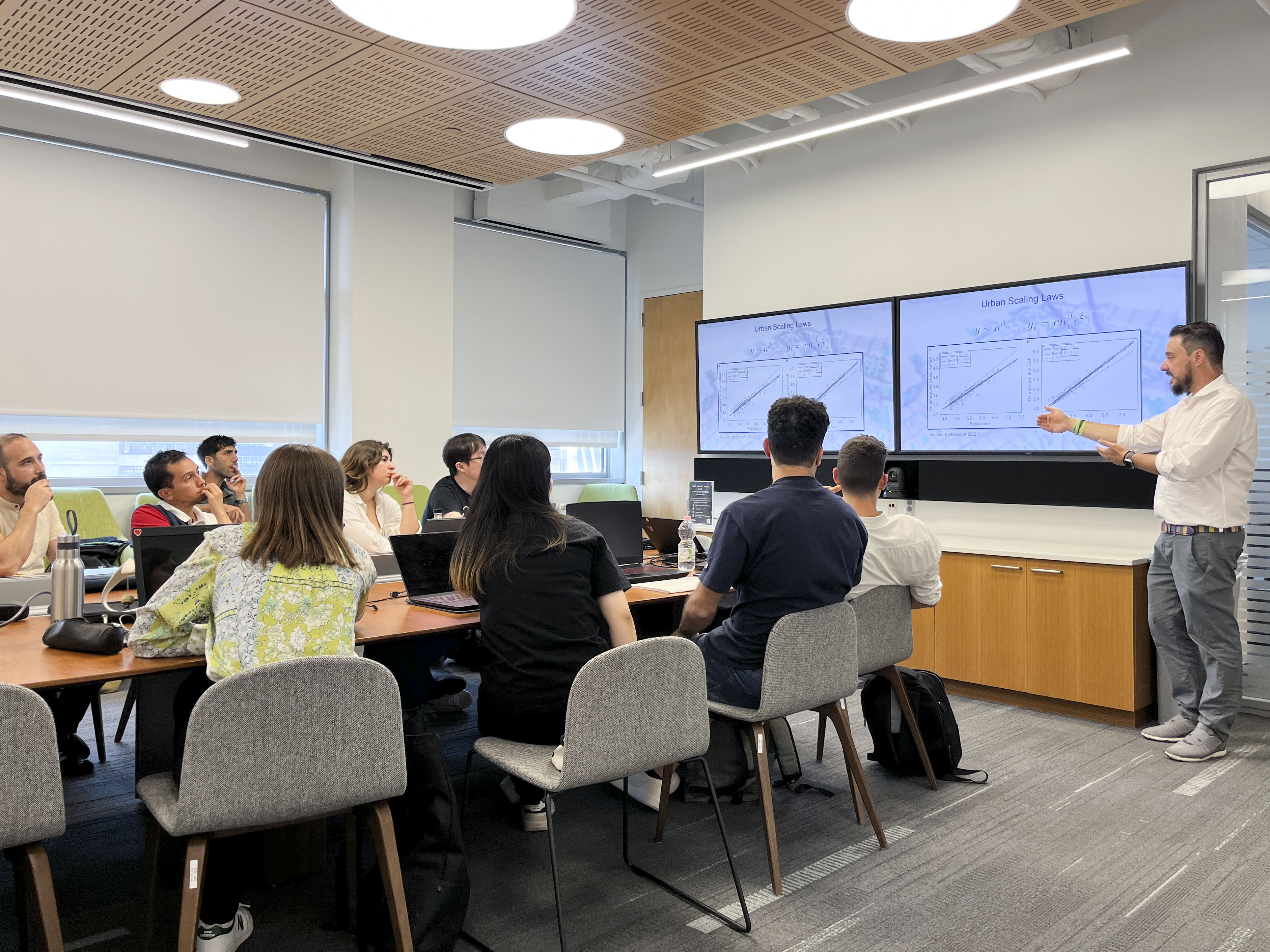CUSP’s international summer school trains a new generation of urban data science scholars

This summer, graduate students from across the globe convened at the Center for Urban Science + Progress (CUSP) at New York University’s Tandon School of Engineering for a three-week summer school dedicated to urban data science. Partnering universities included the National and Kapodistrian University of Athens, the Technological University of Uruguay, the University of Lisbon, and the University of Tuscia. Each week, participants explored cities through a different lens: hydrology, urban metabolism, and thermal conditions. Throughout the program, cross-cutting talks provided visiting faculty as well as CUSP faculty and researchers with opportunities to present their diverse research areas adjacent to these broader topics.
“International partnerships are critical to understand commonalities in urban science training and research across the globe,” said Maurizio Porfiri, director of CUSP and institute professor of Biomedical Engineering, Mechanical and Aerospace Engineering, and Civil and Urban Engineering at NYU Tandon. “Our summer school brought together data and talent, making tangible steps in addressing the climate challenges our cities are facing.”
The curriculum was led by Porfiri together with Constantinos Cartalis, professor at the National and Kapodistrian University of Athens; Juan Marrero, director of the Center for Digital Transformation at the Technological University of Uruguay; Paulo Ferrão, distinguished professor at the University of Lisbon and president of the IN+ Center for Innovation, Technology and Policy Research (IN+); Patrícia Baptista, assistant professor at the University of Lisbon and senior researcher at IN+; and Salvatore Grimaldi, professor at the University of Tuscia and president of the European Cooperation in Science and Technology.
 “It was fascinating to see how our topics fit together and how CUSP provided transversal skills to approach them differently,” said Baptista. “In the first week, we focused on hydrology — studying the impacts of rain, how it changes over time, and how we can predict it — which isn't directly related to my work. However, the methodologies they applied [to hydrology] can also be used in my field,” said Baptista. “The topics complement each other well in promoting a sustainable urban environment.”
“It was fascinating to see how our topics fit together and how CUSP provided transversal skills to approach them differently,” said Baptista. “In the first week, we focused on hydrology — studying the impacts of rain, how it changes over time, and how we can predict it — which isn't directly related to my work. However, the methodologies they applied [to hydrology] can also be used in my field,” said Baptista. “The topics complement each other well in promoting a sustainable urban environment.”
Grimaldi and Francesco Cappelli, a researcher at the University of Tuscia, led the first week with an in-depth exploration of urban hydrology, focusing on rainfall modeling and simulations. Students utilized R code to analyze a dataset containing daily and sub-hourly rainfall records spanning 2001 to 2020, gathered from 80 locations in northwest Italy. Their analyses encompassed exploring rainfall in relation to geography and investigating patterns to define and identify extreme rainfall events in the dataset.
 During the second week, Baptista and Ferrão introduced urban metabolism together with Tiago Farias, an associate professor at the University of Lisbon, and Ricardo Gomes, a postdoctoral researcher at IN+. Urban metabolism is a framework to promote the understanding of how major cities, in different contexts, have contributed to and will promote structural transformation and economic shifts. Exploring a dataset that encompassed 30 European countries within a span of 20 years (1995–2015), students asked questions such as: Can lessons be learned from these nations that enhance urban growth elsewhere? Can the urban metabolism framework inform the design of more efficient urban infrastructure?
During the second week, Baptista and Ferrão introduced urban metabolism together with Tiago Farias, an associate professor at the University of Lisbon, and Ricardo Gomes, a postdoctoral researcher at IN+. Urban metabolism is a framework to promote the understanding of how major cities, in different contexts, have contributed to and will promote structural transformation and economic shifts. Exploring a dataset that encompassed 30 European countries within a span of 20 years (1995–2015), students asked questions such as: Can lessons be learned from these nations that enhance urban growth elsewhere? Can the urban metabolism framework inform the design of more efficient urban infrastructure?
“It was very important for the students to understand the concepts of sustainability,” said Baptista. “If we continue increasing GDP in the same way, we'll consume far more materials than we have available. We introduced students to interesting topics of research productivity and explained why we must start extracting value from materials by consuming less. We also discussed concepts of self-sufficiency — can our society be sustainable if we continue doing exactly what we are doing now?”
The final week featured lectures by Cartalis and Kostas Philippopoulos, a researcher at the National and Kapodistrian University of Athens, on urban thermal environments, specifically the assessment and mitigation of urban heat. Students learned to use Google Earth Engine and apply the scientific method in GIS. Each group conducted comparative assessments of urban heat in 2-3 cities, analyzing parameters including the land surface temperature, vegetation index, built-up index, temperature, precipitation, and population density. They also proposed mitigation and adaptation measures such as increasing vegetation, implementing cool roofs, and developing emergency plans.
"We had interesting discussions, and I believe we're planting seeds for the future. Even if I don't have a problem now, I might in a year, and I can apply the methods learned or consult with someone I met here,” said Baptista. “This is the main contribution of the summer school for both students and faculty.”




